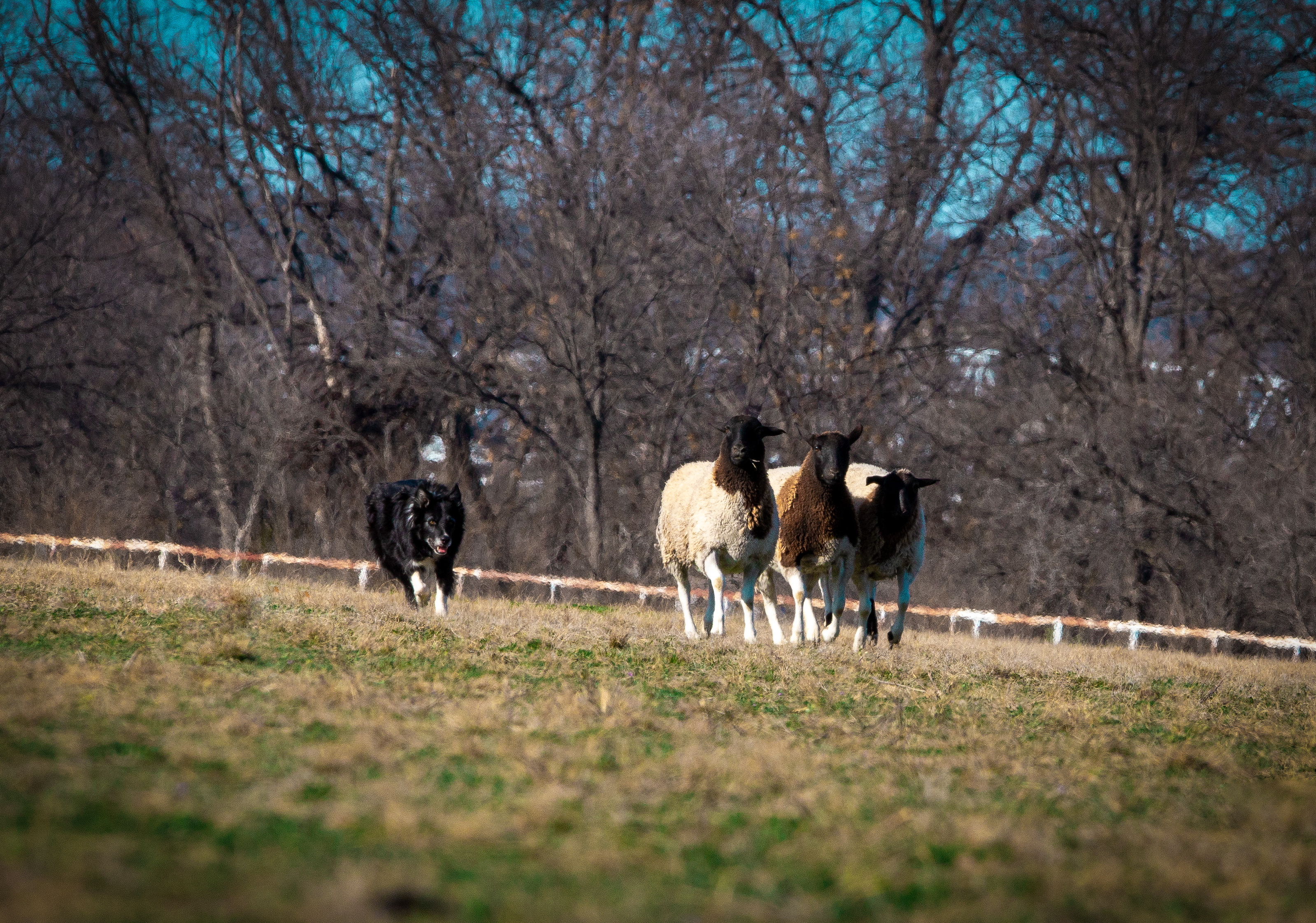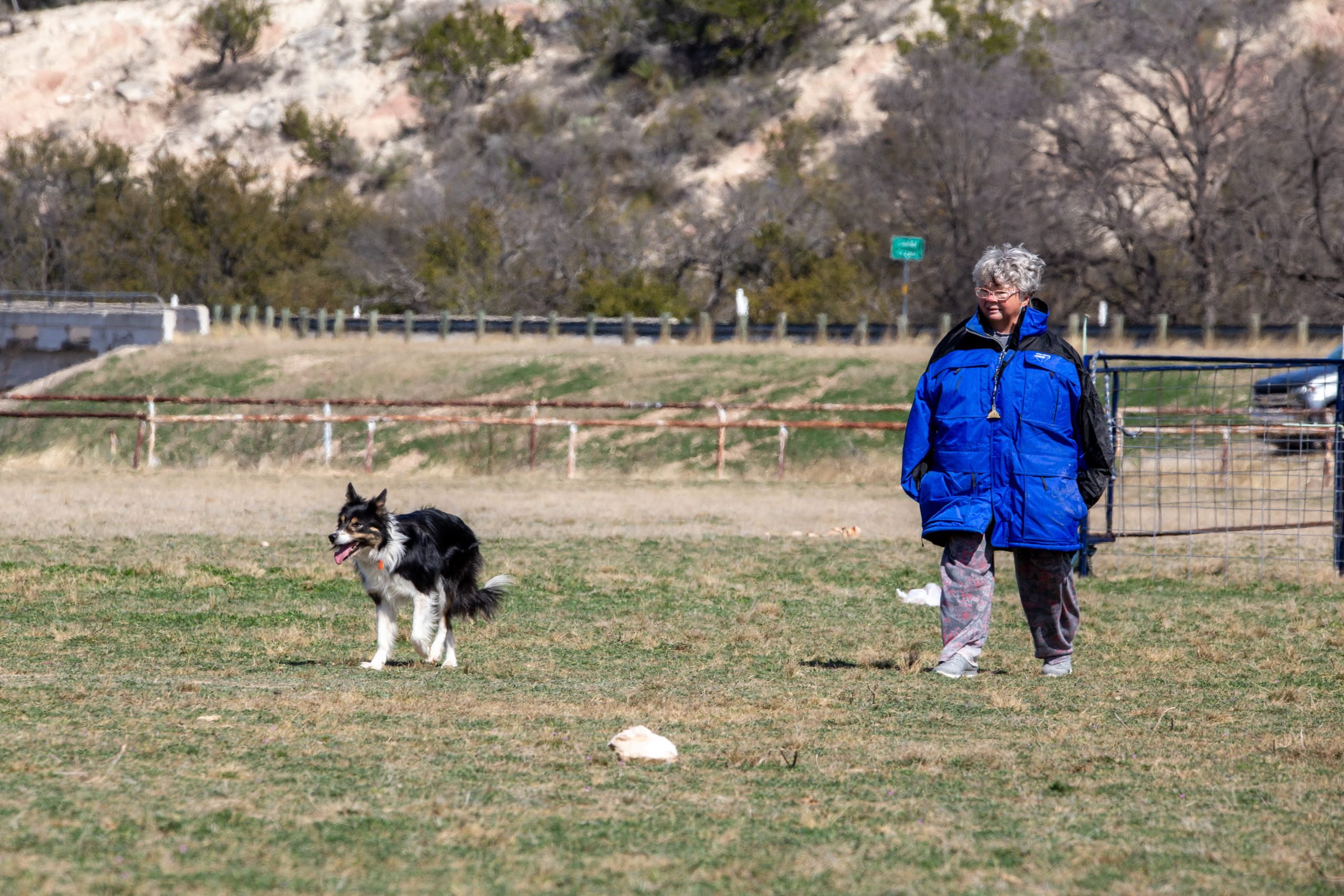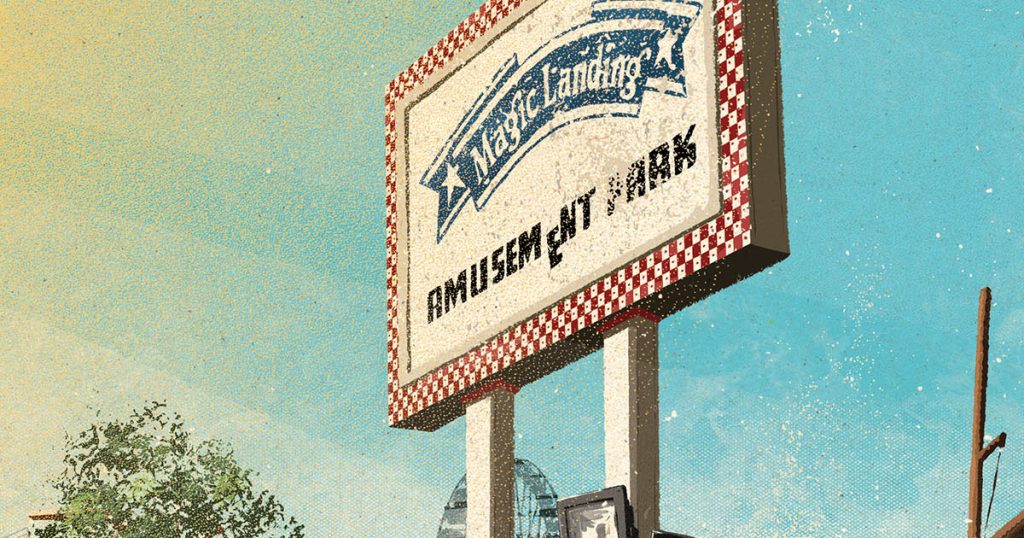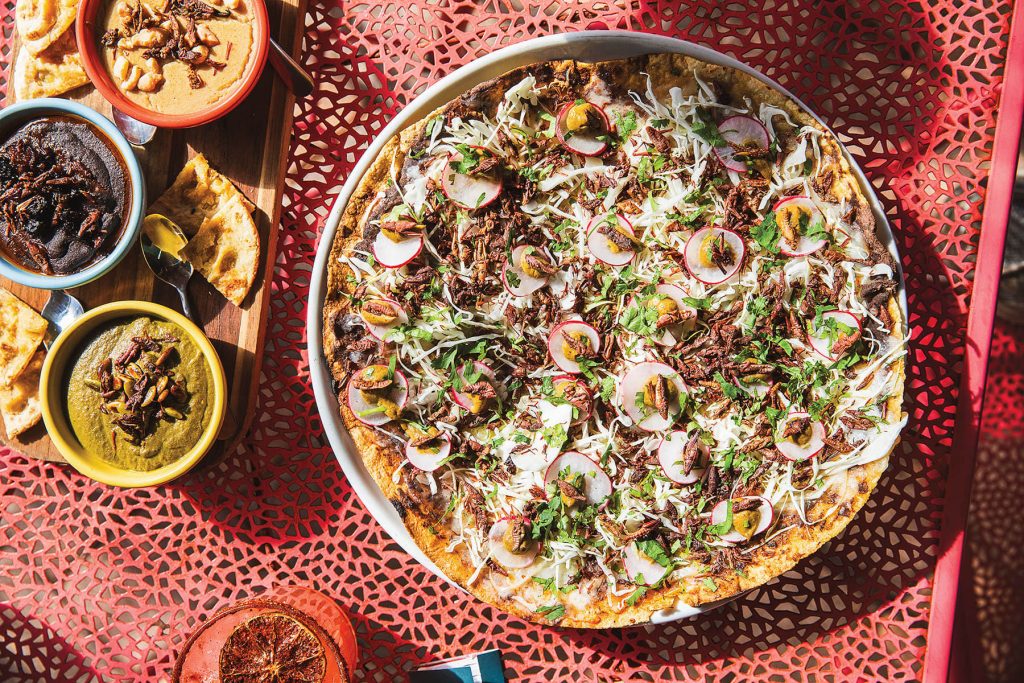
A competing dog is judged by how well it follows its shepherd’s instructions to herd a group of sheep between a series of painted wooden panels and into a metal pen within 10 minutes. Photo by Christopher Collins
Donna Rock’s eyes follow the three Dorper sheep as they make a tight curve at the base of a mesquite tree 300 yards in the distance. They turn in unison to the south, their hooves cleaving the clover and bunchgrass that mottle the pebbly frozen soil. A triangular metal whistle pursed between Rock’s lips blows shrill notes downrange; a 5-year-old border collie named Emily comes into view, a speeding black speck on the horizon, flanking the flock on the left. The dog hears Rock’s whistle—from 250 yards away now, and in the face of a gale-force wind from the north—and expertly interprets the instructions to keep the sheep moving.
Rock and Emily have been working on this routine for years. They’ve gotten so good that they’ve taken their show on the road, traveling across the United States to participate in sheepherding competitions. This one, the Texas Sheep Dog Trial on the Pecos Trail, is taking place at the fairgrounds in Junction, a town with a population of 2,500 at the intersection of the Texas Hill Country and West Texas. The contest is hosted by the Texas Sheep Dog Association, an organization founded in 1963 at San Saba by “a small group of border collie enthusiasts,” according to the group’s website.
It’s a sport you’ve probably never heard of, one that started in Wales in 1873 and spread to the Americas, drawing interest from a colorful cast of characters and their canine counterparts. Around 20 such events are held in Texas each year. Approximately 50 people entered the four-day contest in Junction, populating the fairgrounds with an army of dually trucks and RVs and diesel generators all tuned to the same burping om note. Competitions involve each shepherd instructing their dog to herd a group of sheep between a series of painted wooden panels, ending up in a metal pen within 10 minutes. The judge sits in the cab of a pickup behind the team, grading them on precision, speed, and demeanor (dogs that nip at the sheep are disqualified and their handlers face a $300 fine).
These shepherds are weekend warriors: Most have a day job, or they’re retired from one. There’s a real estate lawyer, a firefighter, a feedyard manager, a retired police communications operator, a few ranchers, and some cowboys who ran the rodeo circuit in their youth. They come from all over Texas and beyond, including California, Wyoming, and British Columbia, Canada. Rock is from Missouri. One entrant, Faansie Basson, is a South African with decades of experience running a commercial sheep ranch. Now living in Hico, he is regarded as the jetsetting Tiger Woods of competitive sheepherding—in the months before the Junction trials, Basson was plying his trade at the World Cup in Ireland, and then in Switzerland, where he conducted training clinics. But shepherding is a challenging and unpredictable endeavor even for an old pro like Basson. “It’s a little like golf,” he says. “There’s usually not a perfect shot in golf, and you can almost never make a run good enough. It’s satisfying, but it’s also very annoying at the same time.”

Emily and Donna Rock compete in the Texas Sheep Dog Trial on the Pecos Trail in Junction. Photo by Christopher Collins
Rock likens the experience to driving a car. “You have to be aware of the turn ahead of you,” she says. “If you brake too late, you’re in trouble.”
The few folks braving the elements on this sunless February morning sit in a line of folding chairs behind the 60-year-old retiree, who wears slip-on sneakers, pajama pants, and a puffy, electric-blue coat. The other entrants are eager to see how Rock performs. She’s a real contender—last year she was invited to the National Finals in Carbondale, Colorado, eventually reaching the semifinals and placing No. 23 out of 150. What’s more, Rock accomplished the feat without the benefit of arms; she was born without them, and instead of using prosthetics, she uses her legs and feet to accomplish everyday tasks. Today, that means getting three sheep into the metal pen just behind her and latching a gate so they don’t escape. But Rock doesn’t fret over it too much. After all, being born without arms sharpens your problem-solving skills. “Honestly, my whole life—every day—has been me thinking, ‘How am I gonna do that?’” she says.
Right now Rock is more worried about the sheep than the pen. She watches as Emily and the sheep continue to ramble toward her, halving the distance between them from 150 yards to 75, then to 50, and 25. In the sport of sheepherding, this is the moment of truth. Rock removes her bare left foot from its shoe and hooks it underneath the pen gate’s frigid chainlink, swinging it open in a wide arc. But as Emily steers the sheep to approach the pen, they deign to enter, instead dropping their heads to graze on the scrubby vegetation. Their bleats become insolent; their muscles flex underneath a thin white coat of wool. Make me, they say in their strange ruminant language.
Rock knows what to do—this ain’t her first rodeo, so to speak. “Sit!” she hollers, her hoarse voice dribbling out from the cloister of puffed jacket piled around her neck. Emily obeys, sinking to her haunches in the grass behind the sheep to encourage them to file into the pen. Now for the finishing touch: Rock picks up a rope from the ground, flinging it through the air so that it flips over and around the gate post, cinching it closed. After nearly eight minutes of herding, Rock has caught her flock. The sheep are released a few moments later, no worse for the wear. Emily bounds over to her owner for a pat on the head, which is given by foot, and the duo heads in the direction of Rock’s trailer. Once inside, out of the cold, they may drowse; it’s only natural to nod off after a long morning counting sheep.
In their two runs in the Open Ranch division, Donna Rock and Emily finished No. 8 and No. 14 out of 33 entrants. Faansie Basson came in No. 2 and No. 3 out of 66 entrants with his dogs Jack and Finn. Complete trial results can be found here. The next trial takes place in Aquilla, between Dallas and Waco, on March 16.








